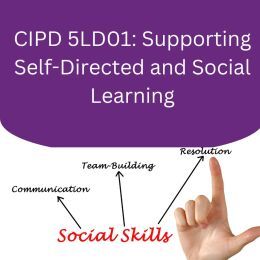CIPD 5LD01 Example: Supporting Self-Directed and Social Learning

TASK 1
AC 1.1: Explain the concepts of, and connections between self-directed and social learning.
self-directed learning is individual drive to foster self-manage changes in life through adopting better approaches with careful planning, evaluating available resources to learn for getting success in life. This process helps individuals to develop logical mind-set to take rational decisions, develop confidence and update skills by analysing, monitoring, & evaluating with available options. Self-directed learning helps to develop skills to become mature, self-disciplined and organised.
Social learning is process of getting influenced with few prominent role model or successful people to bring positive changes for achieving verifiable success inlife. Social learning process motivate individuals to take notice from leading people for developing mind-set to reproduce same results or better with previous results.social learning process strongly constructedand connects with self-directed learning processthat facilitate to develop better controls that boost confidence and bring positive changes in life.social-learning process easily overlap SDL directly with observational learning-process in which social variables influenced individual behavior for taking initiatives to plan, evaluate and improvised with external entities to self-development for getting excel at workplace.
Social cognitive theory:
Social cognitive theory prescribe by Albet Bandura covers how human being motivated with environmental that transform toimprove behaviours. Environment can be internal or external make social influence by emphasising on how individuals acquire and maintain behaviours to perform better in society.Self –directed learning process covers inthis theory connects with social learning process that how individual past experiences play a key factor that influence behavior action in human beings. As past experiences influences actual renewed reinforcement, future expectation that will decide how person engage with certain behavioursfor getting expected outcomes. Sociallearning emphasised about how people regulate themselves with certain specific behaviours maintained over period of time to achieve respective goals. In numerous human behavior levels social ecological impact human behavior that change individual perspectives and thinking patterns as major focus point that helps to evolve human behaviours.
Human behavior theory:
human behavior theory explain how human being change behaviours by analysing antecedents and consequences that directly linked with social learning process in which individual environments that gone through over years. Humanbehaviours can being optimistic, pessimistic, trust worthy and being envious. As social learning proposed by Bandura emphasize on learning through observing, modelling and imitating or people behavior through getting connected with emotions to improve human being behavior through continuous learning process.
There is a connection between self-directed and social learning since both involve collaborative work. Collaboration has been utilised in a number of academic contexts; occasionally, individuals select whether to study alone or in groups based on their learning styles and preferences (Boyer et al., 2014). As viewed through the constructivist perspective of Vygotsky (1978), collaborative learning is an effective technique whereby individuals work together to acquire information and achieve a common goal. Cooperative learning is emphasised by both models, hence they are connected. Cooperative learning is a methodical approach to education that blends classroom instruction with on-the-job training. Cooperative learning, sometimes known informally as “co-op,” is a form of academic credit awarded for supervised job experience (Boyer et al., 2014).
AC 1.2 Assess underpinning theories related to self-directed and social learning.
Humanistic/ Piaget’s constructivist theory
Humanistic theory recognises the uniqueness of every person, demanding a personalised approach to education (Boyer et al. 2014). It considers self-direction as both a learning process and a result. The drive to learn stems from inside the learner (Boyer et al. 2014). Humanistic philosophy attempts to cultivate individuals who are self-actualizing, self-directed, and intrinsically driven.
Piaget’s constructivist theory of development postulates that an individual’s “self-directed” or “self-regulated” activity produces progressively complex forms of cognition (Waite-Stupiansky 2017).
Benefits
- It allows for the selection of sources, subjects, and space;
- It is practical; there is a relationship to the requirements of the job.
Draw backs
- It is based on the individual’s self-discipline.
- Its evolution is sluggish (Waite-Stupiansky 2017).
- There is face-to-face interaction.
Cognitive Learning theory
Cognitive Learning Theory applies metacognition to explain how the process of learning takes places as influenced by our thoughts. This theory elucidates that learning is more about thinking and it negates the involvement of environment as a factor influencing learning.
Benefits
- Its adaptability in explaining variances in a person’s behaviour or learning, i.e., when a person’s environment changes, the person’s conduct may vary as well.
- It accommodates several modes of learning. Individuals can acquire knowledge through observation or direct experience (Deaton 2015).
Draw back
- It disregards critical nature of accountability in one’s conduct (Deaton 2015).
- The social learning paradigm disregards typical developmental milestones.
- It’s not based on day to day undertakings (Deaton 2015). (Deaton 2015).
Behavioral Learning Theory
Behaviorism, often known as behavioural psychology, is a learning theory that argues that behaviours are learned by contact with the environment through a conditioning process (Erturul & Taluk, 2017).
Benefits
- Clearly stated objectives allow the learner to focus on a singular target.
- It is scientifically credible.
- Real-life application (Ertuğrul & Tağluk 2017).
Drawbacks
- Behavioural theories are a taught process that takes time to learn
- Leaders must consider other variables in managing people.
Bandura Social learning Theory
Albert Bandura’s social learning theory emphasises the necessity of observing, modelling, and mimicking others’ behaviours, attitudes, and emotional reactions. Social learning theory is concerned with the interaction of environmental and cognitive factors that affect human learning and behaviour (Chen et al. 2015).
Benefits
- There are multiple modes of learning
- The most significant advantage of social learning is that it is something that everyone does naturally, consciously or unconsciously, every day (Chen et al. 2015). (Chen et al. 2015).
Drawbacks
- This theory has limitations in that it does not account for individual interpretations of occurrences.
- It is not applicable to all behavioural differences, and it focuses on what occurs in a circumstance rather than on why it occurs (Chen et al. 2015). (Chen et al. 2015).
